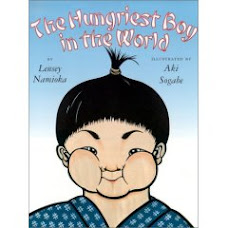BIBLIOGRAPHY
Carmi,Daniella. 2002. SAMIR AND YONATAN, Blue Sky Press. ISBN-10: 0439135230 ISBN-13: 978-0439135238
SUMMARY
Samir is a young Palestinian boy living in Israel. He fractured his knee when he crashed his bicycle on a steep hill. He must go to the Jewish hospital on the other side of town to have surgery. His father waits several days to receive permission to take Samir to the hospital. When he is admitted into the Jewish hospital he shares a room with four Israeli children. Samir's four new friends in the hospital are Jewish and would have been his enemies in another setting. The doctor from America comes but Samir is running a fever and must wait for surgery. As the days pass, the children become friends. Yonatan shares his stories of the stars that he has read and learned from his father.
After the surgery, Samir gets therapy for his leg. Felix, the male nurse has been good to Samir and helps him in the hospital. As time nears for Samir to leave the hospital his spirit appears to be awakened.
CRITICAL ANALYSIS
This is an interesting story about a young boy living in a dangerous environment. His life involves road blocks, curfews and soldiers. It is a look at what life is like for people living in an occupied territory. Samir's younger brother was shot in the back while playing in the street. Samir imagines that he takes his brother's place in death. He feels guilt that his young brother was killed. Rather than a bicycle wreck he thinks it would have been better to have been shot in the leg.
In the hospital, while waiting for surgery he is amazed at the food he is given. He is given three meals a day and the meat that his new friend Yonatan will not eat.
Samir has thoughts of his friend Adnan and his mischievous ways. His old friendship contrasts with his new friendship with Jonatan. The roles of friend and enemy are left open to discovery.
While in the hospital he does not have visitors. The road blocks prevent his parents from traveling. His mother works two jobs and his father runs a barbershop in a time when people cut their hair at home. The book by Carmi, tells of an unfamiliar way of life. It will be surprising for children in the United States to discover the lifestyle of a child living in fear in another country.
Unlike children in most areas of the the United States, Samir is unfamiliar with computer games. When Yonatan shows him how to escape from the here and now, and take an imaginary trip to Mars, Samir is exposed to a different future with possibilities. The story ends with several questions left unanswered.
First published in Hebrew in 1994. The glossary at the end of the book gives definitions of the Hebrew and Palestinian words and phrases. The cover art was created by Rafal Oblinski with acrylic paint. A dove shaped opening in a brick wall represents the opened barrier created by friendship.
REVIEWS
Publishers Weekly
SAMIR AND YONATAN Daniella Carmi. "A Palestinian boy comes to terms with his younger brother's death by an Israeli soldier in this slow-paced but affecting novel originally published in Hebrew in 1994," said PW. Ages 10-up.
Copyright 2002 Cahners Business Information, Inc.
School Library Journal
Grade 4-8-Riding his bicycle down the market steps, a young Palestinian falls and smashes his knee so badly that he needs surgery. For the first time in his life, Samir leaves his home in the Occupied Territories to go to a Jewish hospital where an American doctor will operate on him. While waiting for the procedure, Samir gets to know the other children on his ward, all Jews. Beautiful Ludmilla is pining away for her home in Russia and refusing to eat. Razia hides under her bed in fear of her father. Hyperactive Tzahi can't urinate properly and, most importantly, Yonatan with the crippled arm introduces Samir to the stars, computer games, and the way imagination can take one away from a place of pain. As Samir thinks about the home he misses, details of his family life are revealed. Readers learn that his younger brother was killed, shot while playing in the street by a man wearing the same uniform that Tzahi's brother wears when he visits. His older brother has gone to Kuwait to earn money and his mother works two jobs. His father has stopped talking. As the hospitalized children spend time together, they come to support one another, forming a team that crosses cultural boundaries. Samir and Yonatan take an illegal night outing to commandeer an office computer to play a game. Life in the hospital is described as clearly as life in the Occupied Territories and readers will sympathize with Samir's fear and loneliness and welcome his new friendships. Written in Hebrew but published first in Germany, the book is smoothly translated and will have wide appeal.
Kathleen Isaacs, Edmund Burke School, Washington, DC
Copyright 2000 Reed Business Information, Inc.
CONNECTIONS
*Other books about Palestinian and Israeli children.
Ellis, Deborah. 2006. Three Wishes: Palestinian and Israeli Children Speak. Groundwood Books. ISBN-10: 0888996454 ISBN-13: 978-0888996459
Rifa'i, Amal, Odelia Ainbinder and Sylke Tempel. 2003. We Just Want to Live Here: A Palestinian Teenager, an Israeli Teenager -- an Unlikely Friendship
St. Martin's Griffin. ISBN-10: 0312318944 ISBN-13: 978-0312318949
Nye, Naomi Shihab. 1999. Habibi. Simon Pulse. ISBN-10: 0689825234 ISBN-13: 978-0689825231
*Share a map or globe of Samir and Jonatan's home. Discuss the friendship of the two boys.
Saturday, August 4, 2007
Subscribe to:
Post Comments (Atom)







3 comments:
Hello!
Very good posting.
Thank you - Have a good day!!!
:O)
its a beautiful piece of writing....childhood remains the same irrespective of land ,language and religion..i enjoyed the book after college days borrowing it from my brothers' school library. thanks to Ms.Carmi for making us realise that children are pure always.. they are the hope..
Swarniv Chandra
India
It is so good book that teache us what's happen in the world and how is the two animy can be close friend and that happen to me too as a Arabic girl is to difficult to live with your animy in same pleas but my beast teacher is Jewish and most of my beast friend are jewish and I feel so happy when I am with them and I feel they are very close to me their culture their realigon and a lot of others thing I wish if we can live to gether like friend but some times I think it is impossibly but I never will loss my dream and I will still sand good wishes to god to make us be friend!
Post a Comment